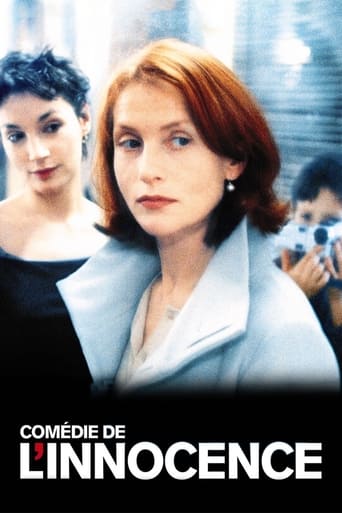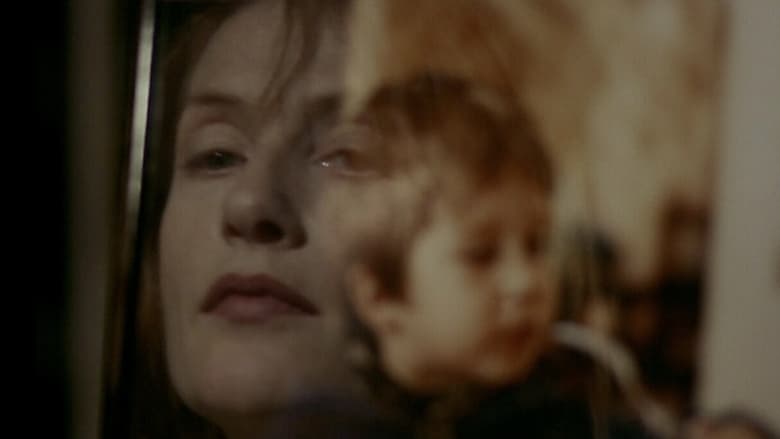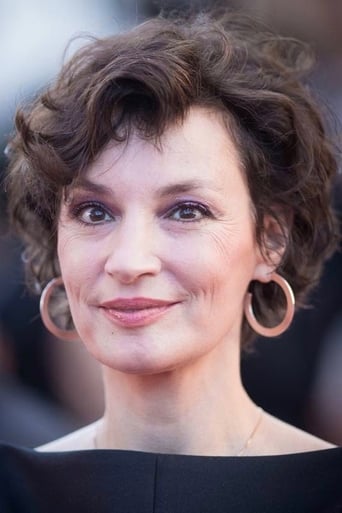

Comedy of Innocence (2000)
Today, Camille turns nine. He had sworn that on his 9th birthday he would show his parents the videos he was shooting on the side - the tail of a cat scampering away, a window, and a veiled woman's face - an intriguing picture... Later that day, Camille's mother, Ariane, meets up with her son in the park. The boy appears perturbed. He is leaning against a tree, eyes cast down. He says that now he wants to return to his "real home" and his "real mother."
Watch Trailer
Cast
Reviews
Although it has its amusing moments, in eneral the plot does not convince.
I think this is a new genre that they're all sort of working their way through it and haven't got all the kinks worked out yet but it's a genre that works for me.
Very good movie overall, highly recommended. Most of the negative reviews don't have any merit and are all pollitically based. Give this movie a chance at least, and it might give you a different perspective.
It's simply great fun, a winsome film and an occasionally over-the-top luxury fantasy that never flags.
I'm beginning a serious affair with Ruiz and what an adventure it is turning into!I originally was directed to Ruiz because of my public esteem for Greenaway; several readers suggested Ruiz. Ruiz clearly comes from the Latin tradition of floating narrative, where layers and magical realities penetrate each other. Where sex and related emotions weave with intellectual perspectives. Where floating without anchors beyond the anchor of lightness itself is the very idea of life.Medem is the one I appreciate the most in this Latin world, though there are many others and I suppose the future of film now the next episode at least is in their hands. Its in the nature of this floating for some artists to fold in layers of extreme self-reference, including notions of what constitutes art, the instant artifact, and in other directions, essays on illusive realities and the charms or multilayered love.Greenaway is something a bit different. His floating is usually bipolar, between the Latin layers on one hand, soft and ephemeral and impulsive and codified frameworks on the other. Frameworks like ordering systems and symmetric containers. Cosmological and human machines for managing reality. The written word, itself dual. For Greenaway, it has to be an artifact first for him to escape the nature of artifacts.Ruiz superficially appears similar, but in fact he inhabits a whole different world. Where Greenaway registers against geometric cosmologies, Ruiz simply works within the form of French cinema. It makes him less because French cinema how to say this gently is bankrupt. Yet, like modern religions of the book, it refers to times and frames of vitality.Yet, it is a haunting notion, to bring this layered Latin floating of realities to a form that supposes that there is only one layer in life and that it is light, somewhat capricious and animated by the female urge.What we have in this film is a space where every character is creating multiple realities: each person is in control and mad at the same time. In control, because he or she creates the realities we see. Mad because they cannot control them or separate them. each of these reflects into the artifact of the film.We have the boy, who is an obsessive filmmaker, already by his ninth birthday his life and film have merged. He splits into three persons: the one his mother bore, a second one another woman had and lost and a third, Alexander, seen as imaginary by his mother.We have the mother (a theater designer and painter) from whose perspective she splits into two women, both vying for the boy who died two years ago. One reality of this woman is that she is simply floating, French-wise, though intimate peelings that reveal ever more soft a soul. Another is that she is the other woman, a violinist inmate in a madhouse where she imagines her doctor to be her brother. She sees the madhouse as the family home, the other inmates as statues. There's Serge, who the mother sees as her brother and in her other self as the psychiatrist of the madhouse. He is the fellow who sees. He blends with the boy, their toy-films are shared. It is because of Serge's lunchtime screws with the housekeeper/governess that the boy is unattended and drowns.This is the French core, sex generated folded realities. In the DVD extras Ruiz says he had to do it this way because it is "against the law" to have ghosts in French films. That young sexy girl is the fulcrum of the thing, her torso locked in throwing the dice and always getting the same number, what she calls "inverted probabilities."It isn't lifealtering stuff. But it is fine, Very fine, the house as the character.Ted's Evaluation -- 3 of 3: Worth watching.
A beautiful film of Chilean director Raul Ruiz; which transports to us through the peculiar world of the Camille young person. It is a new birth as it says well, nine years is serious thing: like all birthday. The glance of Camille is surrealist, is happened to him that her mother no longer is so, but so single a name (Ariane). And with her, it is directed in adventures in search of his mother, who the delay in a place very far. This is the real adventure that my proposes to us - to seem Raoul Ruiz, everything is not imagination neither surrealism, the Camille young person does not try fantasies nor whims as all adult tries to include/understand. Then or it is included/understood or it is not taken care of..., but what it is what happens when the no-reality is approached to us, and falls finally in our same refuges? Different perspective. A very safe one, the one of Camille... its tapes shows the world that sees us... from there down, where the chairs are castles... and the smoke ghosts... On the other hand, the drama... that always remembers thanks to us to the guessed right sound track, the mother who loses her son: and what is worse, it is not kidnapping. one goes away because it must go away more above... and, will really be his mother? The summary appears to us during the film, both faces turn and they appear before the judgment of Salomón... the watching doubt...: to whom to believe? who decides? The negative: The robust step of the fantasy to the reality... the alive explanation of a tragic picture... But really, cinema of which it is possible to be seen more of twice...
... and while you're about it save the plot. I am always going to see anything Isabelle Huppert does. She is far and away the finest French actress currently working and few international actresses can touch her but she does have a wilful side and in the last few years seems drawn to anything from off-the-wall (as here) to sleaze (Deux, The Piano Teacher) so fans don't have it easy and given her current track record we can only assume 8 Femmes was an aberration. This is a case of style over content, everything hinges on the unrealistic premise of Huppert saying 'okay' when she should have said 'get a life' as ninety nine mothers out of a hundred WOULD do in similar circumstances. It's not really enough to pepper the cast with certifiable nannys and neighbors because that only makes the SEMI intelligent viewer shout WHY. Why does Huppert continue to employ a nanny/au pair who declines to eat as one of the family and is constantly throwing dice which always turn up 7 and neglecting the nine year old when they are out together. Why, for that matter, does Huppert's brother, a psychiatrist, no less, become disturbed if anyone touches his toys (Huppert has inherited the family home, where she and her brother grew up, from her parents and the brother's toys are still stored there), given that Huppert has, by definition, lived in Paris all her life and that Paris is a very compact city, why is she TOTALLY unfamiliar with other arrondisiments other than the one in which she lives, why, when Huppert, a total stranger, calls on Jeanne Balibar only to find her out, does Balibar's neighbor, who has a key, cheerfully let this stranger into her neighbor's apartment (perhaps 'cheerfully' is the wrong word, given the neighbor's penchant for gloomy predictions. I could go on but you get the picture. As long as we're asking pertinent questions, why did Denis Podalydes, an established and respected actor, agree to what is little more than a cameo, and why, for that matter, even ask a well-known actor when an unknown would do. On the credit side Huppert is tremendous and Balibar not far behind but it's Class Acting that feels like an Acting Class and not a movie.
Recommended for fans of Isabelle Huppert only. Her performance is good as always, but nothing else in the film seems to fit very well. The premise is not at all bad, but the film loses its direction fast. The director only confuses things further by trying to make it seem like a chilling supernatural horror tale, when in reality it is not. Not too painful to sit through, but a waste of time and money nonetheless.


